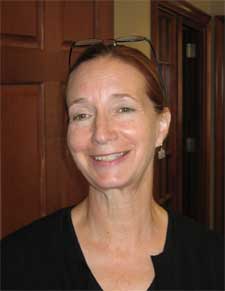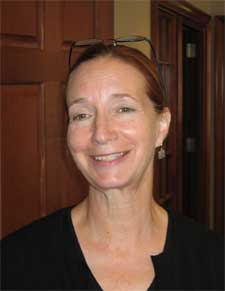 Continues vital role as neutral forum for discussion of coastal issues
Continues vital role as neutral forum for discussion of coastal issues
KINGSTON, R.I. – March 15, 2010 – The role of the Coastal Institute at the University of Rhode Island is evolving under its new director, Judith Swift, while it also maintains its founding principle to serve as a neutral forum for the discussion of issues facing the state’s coastal ecosystems.
Swift, who has served as the Institute’s associate director since 2000, is a URI professor of communication studies and theatre who, since the 1980’s, has worked to find new ways to communicate science and scientific issues to the public. She has produced a series of musicals about oceanography, computer science, health science and, most recently, a It’s A Shore Thing: A Coastal Cabaret, which has been performed at science conferences and other venues around the country.
“One of my primary roles is to work with scientists to translate scientific information to other constituencies so it’s understandable,” said Swift, who was appointed director of the Coastal Institute last fall, succeeding founding director Peter August. “There is enormous frustration in society that scientists have a moral and ethical obligation to stick to the principle of scientific uncertainty, but scientific uncertainty in a political landscape is the perfect weapon for denying the legitimacy of the science.”
The Coastal Institute was launched in 2000 to serve as a neutral forum to bring together different constituencies – the public, scientists, policy makers, and other interested parties – to foster debate on vital issues related to the coastal environment of Rhode Island and New England. It partners with state and federal agencies, local organizations and special interest groups to foster discussion.
One early success story was a yearlong series of meetings among the fishing community, government regulators and fisheries scientists to examine the decline of fish stocks and how it could be rectified.
“The success story is that it happened at all,” Swift said. “There was an enormous amount of tension brewing over the depletion of fisheries, competition with aquaculture, regulations and fishing limits, so the mere fact that the Coastal Institute was able to host meetings and bring people together to talk about it is important.” Swift credits the success of these meetings to the leadership of Peter August, a standard she hopes to emulate.
The range of issues with which the Coastal Institute involves itself has grown significantly over the years, due in part to its definition of what it considers to be a coastal issue. Swift said that the Institute can play a role in issues involving anywhere from uplands surrounding watersheds to the continental shelf.
“In truth, the whole state is a coastal zone, so the Coastal Institute has implications for the whole state,” Swift said.
One Institute initiative about which Swift is most proud is the IGERT Project (Integrative Graduate Education and Research Traineeship), which she co-directs with August, a National Science Foundation-funded program to educate doctoral students in coastal ecosystem management using a multidisciplinary, problem-solving approach that emphasizes peer-to-peer learning. She said it fosters a new generation of scientists to think in interdisciplinary ways so they can respond effectively to issues in various arenas.
Swift is working to implement two new programs this year: a fellowship program for graduate and undergraduate students, and a scholars-in-residence program. The fellowship program will engage students in interdisciplinary learning on coastal issues and provide them with opportunities that may ordinarily be out of their reach. The first undergraduate fellow, Marisa Nixon of Jamestown, was selected last month and will work with the state’s Climate Change Collaborative to implement a model of behavior change to encourage Rhode Islanders to believe the science of climate change and take action to reduce their carbon footprint.
The scholars-in-residence program will enable URI faculty members, especially those that do not ordinarily work on coastal issues, to receive support for research or education on topics of interest to the Coastal Institute.
“As you move from place to place, the cultures can be radically different. But our faculty don’t have to go from URI to Stanford to have a unique experience; they can go to another part of URI to have that experience,” said Swift. “And that experience will filter back into their teaching and increase the environmental literacy of our students.”
Swift pointed to several notable Coastal Institute activities in the first months of her tenure as director that she says illustrates the kind of work she hopes to continue. The Ocean Policy Task Force of the U.S. Council on Environmental Quality visited Rhode Island in September to seek input from stakeholders on ocean issues, and it chose to meet at the Coastal Institute in part because it was a neutral forum. Similarly, when the new science advisor to the National Park Service, Gary Machlis, sought to meet with the academic community of the region to discuss issues of concern to national parks, he chose to meet at the Coastal Institute.
“Fortunately, I have exceptional scientists working with me at the Coastal Institute and throughout URI and other state universities and colleges. Since I don’t have a science background, it’s always challenging to get up to speed on a new issue,” Swift said. “But it also means that I know what the public is going to say if they don’t understand an issue. I’m careful that I don’t assume what I don’t know, and I carefully ask questions that I think the public will want to know. I believe this perspective will serve the Coastal Institute well.”

